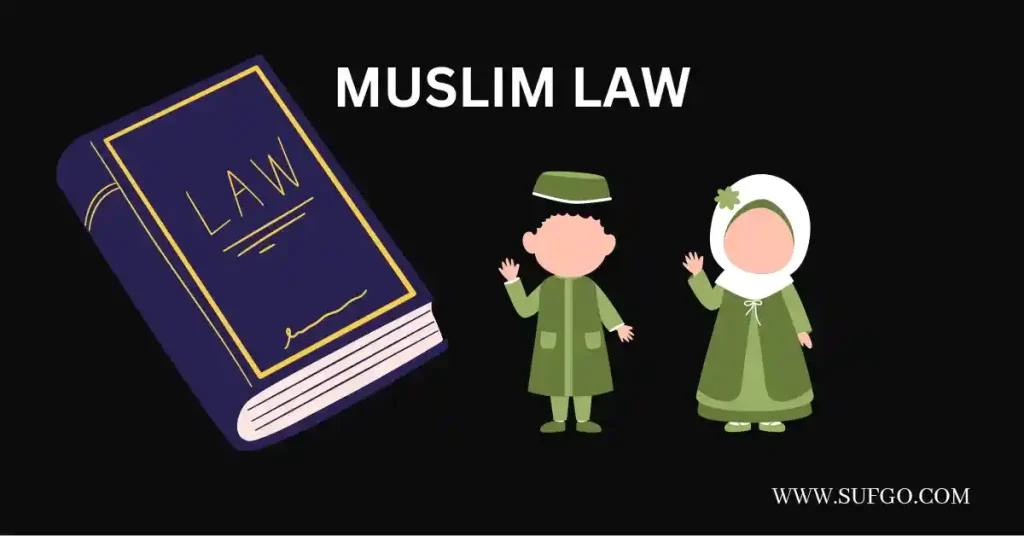Muslim law is based on the Quran and the Hadith, or sayings of the prophet Muhammad. It is the official law of Islam, and its rulings are binding on Muslims. Because Muslim law is based on religious texts, it can be quite complex. In this blog post, we will explore some key sources of Muslim law and what they mean for you as a non-Muslim individual. We will also look at some common questions about Muslim law and how to best answer them. so that you can get a better understanding of this important part of Islamic culture.
Nature of Islamic Law
Nature And Sources of Muslim Law, Islamic law is derived from the Quran and the Sunnah of Muhammad. It covers legal principles as well as religious rituals and ceremonies. Sharia, or Islamic law, applies to every Muslim, regardless of their nationality or religion.
Sharia is composed of five primary sources: the Quran (the word of Allah), the Hadith (the sayings and deeds of Muhammad), Ijma (consensus), Qiyas (analogical reasoning), and Hanafi jurisprudence. While there are variations among schools of thought, all adhere to certain core principles.
The first principle is that Islam is a complete system of law with its own set of rules governing everything from personal behavior to family law. Sharia also contains guidelines for social conduct, economic life, international relations, and death rituals.
Sharia is based on two main concepts: justice and mercy. Justice requires that Muslims follow a harsh interpretation of Quranic teachings such as punishing thieves harshly even if they are children and amputating the hand of someone caught stealing small items. Mercy, on the other hand, calls for leniency in cases where individuals may not have any prior criminal record or where there may be extenuating circumstances such as pregnancy or breastfeeding.
Islamic law also upholds individual liberty and prohibits discrimination based on race, sex, or religion. It enshrines equal rights for women under Islamic law, granting them equal access to education and employment opportunities alongside men. According to surveys conducted by Pew Research
Sources of Islamic Law
There are four sources of Islamic law: the Quran, the Sunnah (the practices and sayings of Muhammad), ijma (the consensus of the Muslim community), and qiyas (analogical reasoning).
The Quran is the literal word of God and is the main source of Islamic law. Muslims believe that it was revealed to Muhammad over a period of 23 years in Arabic. The Sunnah is the record of Muhammad’s life, teachings, and actions as recorded by those who were close to him.
It includes Hadith, or traditions attributed to Muhammad, which are statements about his beliefs or actions that have been passed down through oral tradition. Ijma is based on consensus among Muslims. This means that if two or more Muslims agree on something, then it is considered an authoritative source of Islamic law. Qiyas is an analogical reasoning tool used to derive rulings from specific cases to broader principles.
Sharia as a Legal System
There is no single source of sharia law. Sharia derives from the teachings of Muhammad, the Prophet of Islam. Muslims believe that Allah, the all-powerful and all-knowing creator of the universe, revealed Qur’an to Muhammad through angelic messengers. The Qur’an is a holy book containing revelations from Allah addressed to Muslims.
Sharia consists of two primary sources:
religious law and secular law. Religious law refers to the specific injunctions revealed in the Qur’an and Sunnah (the practices and sayings of Muhammad). Secular law refers to laws enacted by Muslim governments based on Islamic principles.
Sharia is not just a legal system; it is also a complete way of life. Muslims are required to follow Sharia in all aspects of their lives, including their personal beliefs and behavior, their social interactions, and their economic activities. Sharia prohibits many things that are considered morally wrong in modern society, such as gambling, alcohol consumption, and adultery. Muslims must also adhere to a strict code of ethics called fiqh (Islamic jurisprudence).
Muslims believe that sharia is divinely inspired and should be upheld as the highest authority in all matters human. There are several branches of Islamic jurisprudence (legal theory), each with its own methodology and ruling principles. Within Sunni Islam there are four main schools of thought: Hanafi (the most orthodox), Maliki, Shafi`i, and Hanbali; within
Islamic Jurisprudence
Islamic jurisprudence is derived from the Quran and the Sunnah, or practices of the prophets. Islamic law applies to all Muslims, regardless of nationality or place of residence, and it is the only source of law for Muslims.
The origins of Islamic law are found in the Quran and the sayings and actions of Muhammad. The foundations of Islamic jurisprudence were laid in Madinah during Muhammad’s lifetime. The first four schools of legal thought—Hanafi, Maliki, Shafii, and Hanbali—developed in Madinah.
Since then, Islamic jurisprudence has been refined through debate and dialogue between scholars. Today, there are several schools of Islamic jurisprudence with a variety of doctrinal positions on a range of legal issues. Nonetheless, all schools agree on the basic principles underlying Islamic law.
Islamic law is based on four fundamental sources: scripture (the Quran), tradition (the sunnah), reason (fiqh), and analogy (qiyas). Sharia is the comprehensive body of Islamic law compiled over centuries by Muslim scholars. Sharia deals with every aspect of life—from religious obligations to criminal justice—and provides specific guidance on how to live fulfillingly as Muslims.
Muslims believe that God’s laws provide a perfect path for human beings to follow in order to achieve salvation. Islam seeks to put into practice what God has revealed through both scripture and tradition while acknowledging that humans are limited by their. Also read our blog on – How to get divorce in Muslim Law
Conclusion
Muslims have a religious legal system that derives from the Quran and the Sunnah of Prophet Muhammad. The Sharia covers all aspects of Muslim life, including personal law (family law, marriage law, criminal law), economic law (commerce and contracts, property ownership), public international law (the laws of war and peace), and environmental law. There is no single source or interpretation of Sharia that is universally accepted. Rather, there are different schools of thought within Islam on various issues covered by Sharia, known as madhhabs.
What is the foundation of Muslim law?
Muslim law is based on the Quran and the Hadith.
What are the sources of Muslim law?
There are four sources of Islamic law: the Quran, the Sunnah (the practises and sayings of Muhammad), ijma (the consensus of the Muslim community), and qiyas (analogical reasoning).






